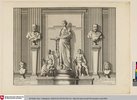
"In Roman mythology, Romulus and Remus (/ˈrɒmjʊləs, -jəl- ... ˈriːməs/) are twin brothers, whose story tells the events that led to the founding of the city of Rome and the Roman Kingdom by Romulus. The killing of Remus by his brother, and other tales from their story, have inspired artists throughout the ages. Since ancient times, the image of the twins being suckled by a she-wolf has been a symbol of the city of Rome and the Roman people. Although the tale takes place before the founding of Rome around 750 BC, the earliest known written account of the myth is from the late 3rd century BC. Possible historical basis for the story, as well as whether the twins´ myth was an original part of Roman myth or a later development, is a subject of ongoing debate." - (en.wikipedia.org 26.12.2019)
 )
)








































































